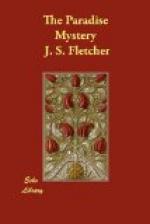“There is the account,” he said. “You can read it for yourself. You will notice that in what Brake’s counsel said on his behalf there are one or two curious and mysterious hints as to what might have been said if it had been of any use or advantage to say it. A strange case!”
Bryce turned eagerly to the faded scrap of newspaper.
Bank manager’s defalcation.
At the Central Criminal Court yesterday, John Brake, thirty-three, formerly manager of the Upper Tooting branch of the London & Home Counties Bank, Ltd., pleaded guilty to embezzling certain sums, the property of his employers.
Mr. Walkinshaw, Q.C., addressing the court on behalf of the prisoner, said that while it was impossible for his client to offer any defence, there were circumstances in the case which, if it had been worth while to put them in evidence, would have shown that the prisoner was a wronged and deceived man. To use a Scriptural phrase, Brake had been wounded in the house of his friend. The man who was really guilty in this affair had cleverly escaped all consequences, nor would it be of the least use to enter into any details respecting him. Not one penny of the money in question had been used by the prisoner for his own purposes. It was doubtless a wrong and improper thing that his client had done, and he had pleaded guilty and would submit to the consequences. But if everything in connection with the case could have been told, if it would have served any useful purpose to tell it, it would have been seen that what the prisoner really was guilty of was a foolish and serious error of judgment. He himself, concluded the learned counsel, would go so far as to say that, knowing what he did, knowing what had been told him by his client in strict confidence, the prisoner, though technically guilty, was morally innocent.
His Lordship, merely remarking that no
excuse of any
sort could be offered in a case of this
sort, sentenced
the prisoner to ten years’ penal
servitude.
Bryce read this over twice before handing back the book.
“Very strange and mysterious, Mr. Gilwaters,” he remarked. “You say that you saw Brake after the case was over. Did you learn anything?”
“Nothing whatever!” answered the old clergyman. “I got permission to see him before he was taken away. He did not seem particularly pleased or disposed to see me. I begged him to tell me what the real truth was. He was, I think, somewhat dazed by the sentence—but he was also sullen and morose. I asked him where his wife and two children—one, a mere infant —were. For I had already been to his private address and had found that Mrs. Brake had sold all the furniture and disappeared—completely. No one—thereabouts, at any rate —knew where she was, or would tell me anything. On my asking this, he refused to answer. I pressed him—he said finally that he was only speaking




